Comprehensive Guide to Garden Maintenance in Staines
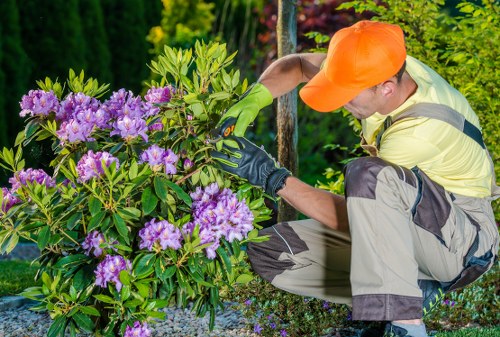
Introduction to Garden Maintenance in Staines
Maintaining a beautiful garden in Staines requires a blend of **expertise, dedication, and the right tools**. Whether you're a seasoned gardener or a novice, understanding the specific needs of your garden can transform your outdoor space into a vibrant oasis.
Staines, with its unique climate and soil conditions, presents both opportunities and challenges for garden maintenance. From selecting the right plants to ensuring they thrive throughout the seasons, proper care is essential.
In this article, we'll explore the various aspects of garden maintenance in Staines, providing you with actionable tips and insights to keep your garden flourishing.
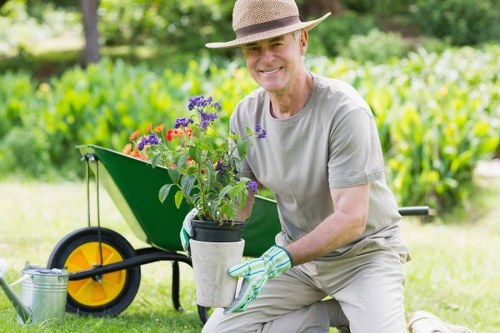
Understanding the Staines Climate
The climate in Staines is characterized by **mild winters and warm summers**, making it suitable for a wide variety of plants. However, the specific weather patterns can influence your garden maintenance schedule.
During the spring, it's important to prepare your garden beds by removing weeds and enriching the soil with compost. Summer months require consistent watering and protection against pests, while autumn is the time to prepare for the cooler months by planting hardy perennials.
By understanding the seasonal changes, you can tailor your gardening practices to ensure optimal growth and health of your plants.
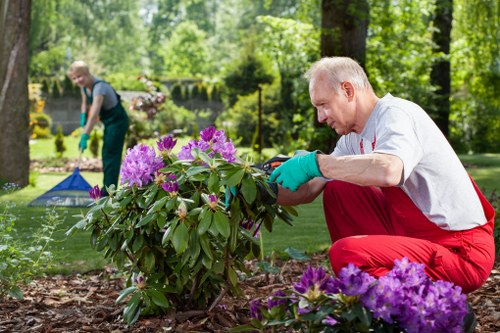
Soil Preparation and Fertilization
Healthy soil is the foundation of a thriving garden. In Staines, the soil may vary from sandy to clayey, each requiring different maintenance techniques.
To prepare your soil, start by testing its pH levels and nutrient content. Adding organic matter such as compost or well-rotted manure can improve soil structure and fertility. Additionally, incorporating **balanced fertilizers** will provide essential nutrients needed for plant growth.
Regular soil maintenance not only promotes robust plant health but also enhances the overall appearance of your garden.
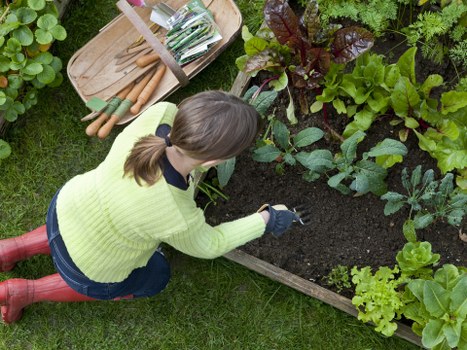
Selecting the Right Plants for Staines Gardens
Choosing the appropriate plants is crucial for successful garden maintenance in Staines. Consider native species that are well-suited to the local climate and soil conditions.
Some popular choices include lavender, roses, and hydrangeas, which thrive in Staines' environment. Incorporating a mix of **annuals and perennials** can provide continuous color and interest throughout the year.
Additionally, selecting drought-resistant plants can reduce the need for frequent watering, making your garden more sustainable and easier to maintain.
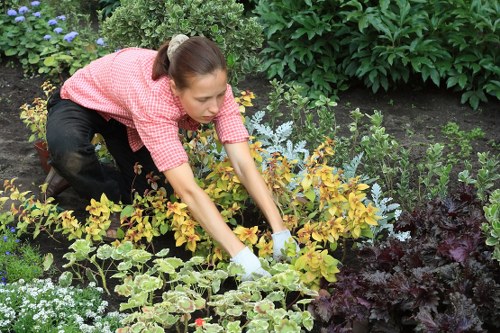
Regular Maintenance Tasks
Consistent maintenance is key to a healthy garden. Here are some essential tasks to include in your gardening routine:
- Weeding: Regularly remove weeds to prevent them from competing with your plants for nutrients.
- Pruning: Trim overgrown branches and dead foliage to promote healthy growth.
- Watering: Ensure your plants receive adequate water, especially during dry spells.
- Fertilizing: Apply fertilizers as needed to maintain soil fertility.
- Pest Control: Monitor for pests and take appropriate measures to protect your plants.
By staying on top of these tasks, you can maintain a vibrant and thriving garden.
Advanced Gardening Techniques
For those looking to take their garden maintenance to the next level, consider implementing advanced techniques such as companion planting and crop rotation.
**Companion planting** involves growing different plants together that can enhance each other's growth and deter pests. For example, planting marigolds alongside vegetables can help repel harmful insects.
**Crop rotation** is particularly useful in vegetable gardens, helping to prevent soil depletion and reduce the risk of disease.

Seasonal Gardening Tips
Adjusting your gardening practices according to the seasons can significantly impact the health of your garden. Here's a breakdown of seasonal tasks:
- Spring: Prepare garden beds, plant new seeds, and start pruning.
- Summer: Focus on watering, weeding, and pest control.
- Autumn: Harvest remaining crops, plant perennials, and prepare for winter.
- Winter: Protect plants from frost, plan for the upcoming season, and perform any necessary repairs.
By following these seasonal guidelines, you can ensure year-round garden vitality.

Tools and Equipment for Garden Maintenance
Having the right tools is essential for effective garden maintenance. Invest in quality equipment to make your gardening tasks easier and more efficient.
Some must-have tools include:
- Pruning Shears: For trimming and shaping plants.
- Garden Fork: Useful for turning soil and aerating garden beds.
- Hose with Adjustable Nozzle: For flexible watering options.
- Wheelbarrow: To transport soil, compost, and plants.
- Gardening Gloves: To protect your hands while working.
Proper maintenance of your tools ensures they last longer and perform better.

Organic Gardening Practices
Embracing organic gardening not only benefits the environment but also promotes healthier plants. Here are some organic practices to consider:
- Composting: Recycle garden waste and kitchen scraps to create nutrient-rich compost.
- Natural Pest Control: Use beneficial insects or homemade remedies to manage pests.
- Mulching: Apply organic mulch to retain moisture and suppress weeds.
- Organic Fertilizers: Choose natural fertilizers over chemical alternatives for soil enrichment.
These practices contribute to a sustainable and eco-friendly garden.

Professional Garden Maintenance Services in Staines
If you prefer expert assistance, numerous professional garden maintenance services are available in Staines. These services can help with everything from routine upkeep to complete garden redesigns.
Professional gardeners offer:
- Regular Maintenance: Scheduled visits for weeding, pruning, and general upkeep.
- Lawn Care: Mowing, aerating, and fertilizing your lawn for a lush green appearance.
- Plant Installation: Expert planting services to ensure your plants are properly placed and established.
- Garden Design: Customized designs to enhance the aesthetic appeal of your outdoor space.
- Pest and Disease Management: Effective solutions to protect your garden from unwanted threats.
Hiring professionals can save you time and ensure your garden receives the best care possible.

Benefits of Hiring a Professional
Opting for professional garden maintenance offers several advantages:
- Expert Knowledge: Professionals have the expertise to handle a variety of gardening challenges.
- Time-Saving: Save valuable time by delegating maintenance tasks.
- Consistent Results: Ensure your garden remains in top condition year-round.
- Customized Care: Receive tailored maintenance plans based on your garden's specific needs.
- Access to Resources: Professionals have access to specialized tools and resources that may not be readily available to homeowners.
Investing in professional services can lead to a healthier, more attractive garden.
DIY Garden Maintenance Tips
For those who prefer a hands-on approach, here are some DIY garden maintenance tips to keep your Staines garden thriving:
- Regular Weeding: Keep weeds under control to prevent them from taking over your garden.
- Proper Watering: Water your plants early in the morning to reduce evaporation and fungal growth.
- Mulching: Apply mulch to conserve moisture and improve soil health.
- Pruning: Regularly trim plants to promote healthy growth and prevent disease.
- Soil Testing: Periodically test your soil to ensure it has the right nutrient balance.
Implementing these strategies can help you maintain a beautiful and healthy garden without professional help.

Effective Pest Management
Managing pests is a critical aspect of garden maintenance. Uncontrolled pests can damage plants and disrupt the garden's ecosystem.
Here are some effective pest management strategies:
- Identify the Pest: Proper identification is the first step in effective pest control.
- Use Natural Predators: Introduce beneficial insects like ladybugs to keep pest populations in check.
- Apply Organic Pesticides: Use environmentally friendly pesticides to target pests without harming beneficial insects.
- Maintain Plant Health: Healthy plants are more resistant to pests and diseases.
- Remove Affected Plants: In severe cases, removing and disposing of infested plants can prevent the spread of pests.
Proactive pest management helps maintain a balanced and healthy garden environment.

Lawn Care in Staines
A well-maintained lawn enhances the beauty of your garden. Here are some essential lawn care tips for Staines:
- Mowing: Regular mowing encourages grass growth and maintains a neat appearance.
- Watering: Ensure your lawn receives adequate water, especially during dry periods.
- Fertilizing: Apply lawn fertilizers to promote healthy and lush grass.
- Aeration: Aerate your lawn to improve soil structure and enhance root growth.
- Overseeding: Plant new grass seeds to fill in bare spots and improve lawn density.
Proper lawn care contributes to the overall health and aesthetics of your garden.

Seasonal Lawn Maintenance
Adapting your lawn care routine to the seasons ensures year-round vitality. Here's how to manage your lawn throughout the year:
- Spring: Reseed bare areas, apply fertilizer, and begin regular mowing.
- Summer: Focus on consistent watering and mowing, and address any pest issues.
- Autumn: Aerate the lawn, apply topdressing, and prepare for overwintering.
- Winter: Minimize foot traffic and avoid heavy mowing to prevent damage.
Following seasonal lawn maintenance practices promotes a healthy and resilient lawn.

Garden Irrigation Systems
An efficient irrigation system is vital for maintaining a healthy garden. In Staines, where summers can be warm, ensuring your plants receive adequate water is essential.
There are several types of irrigation systems to consider:
- Drip Irrigation: Delivers water directly to the plant roots, reducing evaporation and water waste.
- Splash Irrigation: Sprays water over plants, suitable for larger garden areas.
- Automatic Sprinklers: Provides a consistent watering schedule, ideal for lawns and extensive planting beds.
- Soaker Hoses: Simulates rainfall, ideal for vegetable gardens and flower beds.
Choosing the right irrigation system can streamline your garden maintenance and ensure your plants thrive.

Maintaining Irrigation Systems
Once installed, regular maintenance of your irrigation system is crucial to ensure its efficiency and longevity.
Here are some maintenance tips:
- Check for Leaks: Regularly inspect pipes and connections for any signs of leakage.
- Clean Filters: Ensure filters are free from debris to maintain optimal water flow.
- Adjust Sprinkler Heads: Position sprinkler heads to prevent water wastage and ensure even coverage.
- Seasonal Shutdown: Properly shut down irrigation systems before winter to prevent damage from freezing temperatures.
- Monitor Water Usage: Keep track of water usage to identify any inefficiencies or overuse.
Proper maintenance ensures your irrigation system operates effectively and conserves water.
Composting and Soil Health
Composting is an excellent way to recycle organic waste and enrich your garden soil. In Staines, integrating composting into your garden maintenance routine can lead to healthier plants and improved soil structure.
Benefits of composting include:
- Nutrient-Rich Soil: Compost adds essential nutrients to the soil, promoting plant growth.
- Improved Soil Structure: Enhances soil aeration and water retention.
- Waste Reduction: Reduces the amount of organic waste sent to landfills.
- Natural Fertilizer: Provides a sustainable alternative to chemical fertilizers.
- Increased Microbial Activity: Encourages beneficial microorganisms that support plant health.
By implementing composting, you contribute to a sustainable and productive garden environment.

How to Start Composting
Starting a compost pile is simple and can significantly benefit your garden. Here's how to get started:
- Select a Location: Choose a dry, shaded spot in your garden.
- Choose a Container: Use a compost bin or create a designated area with a fenced-off section.
- Add Organic Materials: Combine green materials (kitchen scraps, grass clippings) with brown materials (leaves, straw).
- Maintain the Pile: Turn the compost regularly to aerate it and speed up decomposition.
- Harvest the Compost: After several months, the compost will turn dark and crumbly, ready to use in your garden.
Following these steps will help you create rich compost to enhance your garden's soil health.

Planting and Transplanting
Successful planting and transplanting are essential skills for effective garden maintenance. Whether you're starting a new garden or expanding an existing one, proper techniques ensure your plants thrive.
Here are some tips for planting and transplanting:
- Choose the Right Time: Plant during the appropriate season for each type of plant.
- Prepare the Soil: Ensure the soil is well-prepared with the necessary nutrients and structure.
- Handle Plants Carefully: Avoid damaging roots when transplanting.
- Water Adequately: Provide sufficient water to help plants establish in their new location.
- Provide Support: Use stakes or cages for plants that require additional support.
These practices promote healthy growth and reduce the risk of transplant shock.

Boosting Plant Health
Maintaining plant health is crucial for a vibrant garden. Here are some strategies to ensure your plants remain healthy:
- Regular Inspections: Check plants frequently for signs of pests or diseases.
- Proper Spacing: Avoid overcrowding to ensure adequate airflow and light exposure.
- Support Structures: Use trellises or supports to encourage strong growth.
- Balanced Nutrition: Provide plants with the necessary nutrients through fertilization.
- Stress Reduction: Protect plants from extreme weather conditions with appropriate measures.
Implementing these strategies helps maintain robust and healthy plants throughout the year.

Mulching Techniques
Mulching is a vital practice in garden maintenance that offers numerous benefits. In Staines, applying mulch can help conserve moisture, suppress weeds, and improve soil quality.
Types of mulch include:
- Organic Mulch: Such as wood chips, straw, and compost, which enrich the soil as they decompose.
- Inorganic Mulch: Such as gravel or plastic sheeting, which are more permanent but do not add nutrients to the soil.
- Living Mulch: Ground cover plants that provide similar benefits while adding greenery.
Choosing the right type of mulch depends on your garden's specific needs and your personal preferences.

Benefits of Mulching
Mulching offers several advantages that contribute to effective garden maintenance:
- Moisture Retention: Helps keep the soil moist by reducing evaporation.
- Weed Suppression: Prevents weeds from germinating and growing.
- Temperature Regulation: Keeps the soil cooler in summer and warmer in winter.
- Soil Improvement: Organic mulches break down and add nutrients to the soil.
- Erosion Control: Helps prevent soil erosion caused by wind and rain.
Incorporating mulch into your garden maintenance routine enhances the overall health and appearance of your garden.
Garden Lighting and Aesthetics
Enhancing your garden with proper lighting and aesthetic elements can create a stunning outdoor space. In Staines, incorporating garden lighting not only beautifies your garden but also extends its usability into the evening hours.
Consider the following lighting options:
- Path Lights: Illuminate walkways and pathways for safety and visual appeal.
- Spotlights: Highlight specific plants or garden features.
- String Lights: Add a festive and cozy atmosphere to outdoor seating areas.
- Solar Lights: An eco-friendly option that harnesses solar energy.
- Underwater Lights: Enhance water features like ponds or fountains.
Choosing the right lighting can significantly enhance the beauty and functionality of your garden.

Creating Focal Points
Incorporating focal points in your garden adds depth and interest. Here are some ideas to create captivating focal points:
- Garden Sculptures: Add artistic elements that complement your garden's style.
- Water Features: Incorporate ponds, fountains, or waterfalls for a serene atmosphere.
- Feature Plants: Use striking or unusual plants to draw attention.
- Seating Areas: Create inviting spaces for relaxation and enjoyment.
- Lighting Accents: Use lights to highlight specific areas or features.
These focal points enhance the visual appeal and functionality of your garden.

Garden Safety and Accessibility
Ensuring your garden is safe and accessible is an important aspect of garden maintenance. Here are some tips to create a safe and user-friendly garden:
- Clear Pathways: Keep walkways free of obstructions and ensure they are well-lit.
- Stable Structures: Secure any garden furniture or structures to prevent accidents.
- Non-Toxic Plants: Choose plants that are safe for children and pets.
- Proper Tool Storage: Store gardening tools safely away from high-traffic areas.
- Accessible Design: Incorporate features like raised beds or benches for ease of use.
Prioritizing safety and accessibility ensures that your garden is a welcoming and secure space for everyone.

Seasonal Safety Precautions
Different seasons bring various safety considerations for garden maintenance. Here are some seasonal safety tips:
- Spring: Watch out for early blooming plants that may attract pests.
- Summer: Protect against heat-related issues by providing shade and ensuring adequate hydration.
- Autumn: Safeguard against slippery surfaces due to fallen leaves and wet conditions.
- Winter: Prevent ice formation and protect plants from frost.
Adhering to these precautions helps maintain a safe garden environment throughout the year.

Sustainable Gardening Practices
Adopting sustainable gardening practices benefits both your garden and the environment. Here are some sustainable strategies for garden maintenance in Staines:
- Rainwater Harvesting: Collect rainwater to use for irrigation, reducing water consumption.
- Native Plants: Use native species that require less water and are more resilient to local pests.
- Organic Fertilizers: Opt for natural fertilizers to minimize chemical usage.
- Composting: Recycle organic waste to create nutrient-rich soil additives.
- Energy-Efficient Lighting: Use solar-powered or LED lights to reduce energy consumption.
Implementing these practices contributes to a healthy and eco-friendly garden.

Reducing Environmental Impact
Gardening sustainably helps minimize your environmental footprint. Here are ways to reduce the environmental impact of your gardening activities:
- Minimize Chemical Use: Use organic alternatives for pest control and fertilization.
- Conserve Water: Implement efficient irrigation systems and water-saving techniques.
- Promote Biodiversity: Encourage a variety of plant and animal species to thrive in your garden.
- Recycle Materials: Reuse garden materials and repurpose items where possible.
- Support Pollinators: Plant flowers that attract bees, butterflies, and other pollinators.
These actions support a sustainable garden that benefits the broader ecosystem.
Integrating Technology in Garden Maintenance
Incorporating technology can streamline garden maintenance and enhance efficiency. Here are some technological tools and innovations to consider:
- Smart Irrigation Systems: Automated systems that adjust watering schedules based on weather conditions.
- Garden Management Apps: Digital tools for tracking plant health, maintenance schedules, and garden layouts.
- Weather Monitors: Devices that provide real-time weather data to inform gardening decisions.
- Robotic Lawn Mowers: Automated mowers that maintain your lawn with minimal effort.
- Soil Sensors: Monitor soil moisture, pH levels, and nutrient content to optimize plant care.
Embracing technology can make garden maintenance more efficient and effective.

Benefits of Garden Technology
Utilizing technology in your gardening practices offers numerous benefits:
- Time Efficiency: Automate routine tasks to save time and effort.
- Precision: Provide precise care based on accurate data and monitoring.
- Convenience: Manage your garden remotely with smart devices and apps.
- Resource Conservation: Optimize water and fertilizer usage, reducing waste.
- Enhanced Plant Health: Receive timely alerts and recommendations to address plant issues promptly.
Integrating technology enhances your ability to maintain a healthy and beautiful garden.

Creating a Sustainable Garden Ecosystem
A sustainable garden ecosystem promotes natural balance and reduces the need for external inputs. Here are strategies to create a sustainable ecosystem in your Staines garden:
- Comprehensive Plant Selection: Choose a diverse range of plants to encourage biodiversity.
- Habitat Creation: Provide habitats for beneficial insects, birds, and other wildlife.
- Natural Resources: Utilize natural resources like sunlight and rainwater efficiently.
- Soil Health: Maintain healthy soil through organic practices and minimal disturbance.
- Energy Efficiency: Incorporate energy-saving elements in garden structures and lighting.
Building a sustainable garden ecosystem fosters long-term garden health and resilience.

Balancing Ecosystem Elements
Achieving balance within your garden ecosystem involves managing various elements harmoniously. Here's how:
- Plant Diversity: Incorporate a variety of plants to support different insects and wildlife.
- Natural Predators: Encourage predators like ladybugs and birds to control pest populations naturally.
- Water Management: Implement efficient water use practices to sustain plants without overuse.
- Soil Health: Maintain rich, fertile soil through organic amendments and minimal chemical usage.
- Pollinator Support: Plant flowers that attract bees, butterflies, and other pollinators essential for plant reproduction.
Balancing these elements ensures a thriving and self-sustaining garden ecosystem.
Enhancing Garden Aesthetics
Creating an aesthetically pleasing garden involves thoughtful design and attention to detail. Here are some tips to enhance the visual appeal of your Staines garden:
- Color Coordination: Choose plant colors that complement each other and create a harmonious palette.
- Varied Textures: Incorporate plants with different foliage textures to add depth and interest.
- Layering: Arrange plants in layers, from ground covers to shrubs and trees, to create a rich, layered effect.
- Focal Points: Use garden features like sculptures, fountains, or unique plants to draw the eye.
- Pathways and Borders: Define spaces with pathways and borders to organize the garden layout.
Attention to these elements can transform your garden into a visually stunning and inviting space.

Incorporating Garden Structures
Adding garden structures can enhance both the functionality and aesthetics of your garden. Consider the following options:
- Arbors and Trellises: Support climbing plants and create architectural interest.
- Gazebos: Provide a shaded area for relaxation and gatherings.
- Garden Benches: Offer seating spots to enjoy the beauty of your garden.
- Raised Beds: Enhance plant organization and accessibility.
- Fencing: Define garden boundaries and add structure.
Well-chosen garden structures contribute to the overall design and functionality of your outdoor space.

Maintaining Garden Health
Ensuring the health of your garden involves proactive measures and consistent care. Here are some strategies to maintain garden health:
- Regular Inspections: Frequently check plants for signs of stress, pests, or diseases.
- Balanced Nutrition: Provide plants with the necessary nutrients through proper fertilization.
- Adequate Watering: Ensure plants receive sufficient water without overwatering.
- Proper Pruning: Trim plants to promote healthy growth and remove dead or diseased parts.
- Pest Management: Implement integrated pest management practices to control pests effectively.
Maintaining garden health results in a resilient and thriving outdoor environment.

Preventing Plant Diseases
Plant diseases can severely impact the health and appearance of your garden. Preventing diseases is essential for maintaining a vibrant garden. Here are some preventive measures:
- Proper Plant Spacing: Ensure adequate airflow between plants to reduce humidity and prevent fungal growth.
- Clean Tools: Disinfect gardening tools to prevent the spread of pathogens.
- Resistant Varieties: Choose plant varieties that are resistant to common diseases.
- Healthy Soil: Maintain fertile and well-drained soil to support strong plant growth.
- Watering Practices: Avoid overhead watering to minimize moisture on leaves, which can lead to disease.
Implementing these strategies helps reduce the risk of plant diseases and promotes a healthy garden.

Winter Garden Maintenance
Winter presents unique challenges for garden maintenance in Staines. Preparing your garden for the colder months ensures that it remains healthy and ready for spring.
Here are some winter maintenance tasks:
- Protecting Plants: Use mulch or protective coverings to shield plants from frost.
- Pruning: Trim back dead or damaged branches to prevent disease and encourage new growth.
- Cleaning Garden Beds: Remove fallen leaves and debris to reduce the risk of pests and diseases.
- Tool Maintenance: Clean and store gardening tools properly to extend their lifespan.
- Planning for Spring: Plan your garden layout and order seeds or plants in advance.
Proper winter maintenance sets the stage for a vibrant and productive garden in the following spring.

Winter Plant Care
Even during the winter months, certain plant care practices are necessary to ensure your garden remains healthy:
- Watering Dead Growth: Provide minimal watering to plants that are still active to prevent dehydration.
- Mulching: Apply a thick layer of mulch around perennials to insulate roots.
- Protecting Sensitive Plants: Cover tender plants with frost cloths or blankets to shield them from extreme cold.
- Monitoring for Pests: Check for signs of pests that may overwinter in your garden.
- Avoiding Heavy Foot Traffic: Reduce walking on garden beds to prevent soil compaction and damage to plant roots.
These care practices help maintain plant health and prepare your garden for the upcoming growing season.

Cultivating a Thriving Garden in Staines
Achieving a thriving garden in Staines involves a combination of **consistent maintenance, informed practices, and a passion for gardening**. By implementing the strategies discussed in this article, you can create and maintain a beautiful and sustainable garden.
Remember to:
- Understand the unique climate and soil conditions of Staines.
- Select appropriate plants that thrive in your environment.
- Maintain soil health through proper fertilization and composting.
- Implement effective irrigation and mulching techniques.
- Invest in the right tools and consider professional services when needed.
- Embrace sustainable and eco-friendly gardening practices.
With dedication and the right knowledge, your garden can become a stunning showcase of nature's beauty right in the heart of Staines.
Contact us today to learn more about our garden maintenance services or to book your service now and transform your garden into a flourishing paradise.
